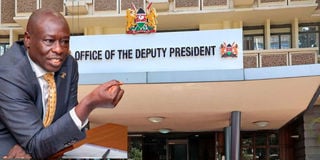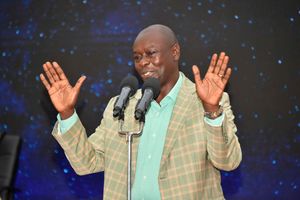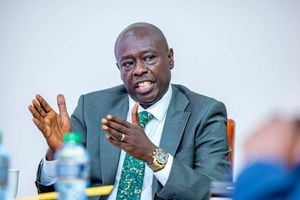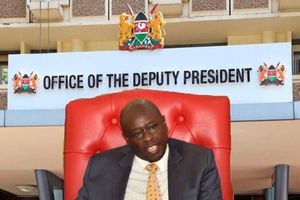
Impeached Deputy President Rigathi Gachagua.
Impeached Deputy President Rigathi Gachagua oversaw enhancement of staff in his office by four times less than a year after becoming the second in command despite having publicly indicated that the Kenya Kwanza administration inherited “empty coffers” when he and President William Ruto took over power in September 2013.
Documents from the Public Service Commission (PSC) — the human resource agency of the government’s mainstream civil service – show that when the impeached DP assumed office, he found a staff of 145 that included technocrats and support workers.
Some staff left with Dr Ruto to pursue other interests. For example, advisors Anthony Kibagendi and Mr John Chikati became MPs for Kitutu Chache South and Tongaren respectively, in the August 2022 General Elections.
The number would later grow to 627 and on April 4, 2023, it expanded to 683 with 56 new additional posts following approval by the PSC of a request through Mr Patrick Mwangi, the Principal Administrative Secretary in the Office of the Deputy President.
“This is to inform you that following consideration of your request, the PSC has granted approval for the establishment of additional posts in the Office of the Deputy President raising the staff establishment to 683,” the PSC letter to Mr Mwangi signed by Dr Simon Rotich, the then secretary and CEO of PSC, reads.
Mr Kibagendi was the advisor on youth affairs with Mr Chikati the advisor on Technical Vocational Education and Training (TVET) before joining politics.
Mr Geoffrey Kaituko also left to become Principal Secretary for Shipping and Maritime Affairs. He was an advisor on conflict management. The Climate Change, Food Security departments that were under the DP’s office during retired President Uhuru Kenyatta’s tenure, were moved to State House by President Ruto in an executive order.
In the enlarged staff establishment, Mr Gachagua got three new offices for advisors on education, economic trade and investment.
On October 19, 2024, Mr Mwangi issued a memo sending 108 staff at the DP’s office on compulsory leave.
But when Nation contacted to him on the status of the 575 remaining staff, Mr Mwangi noted; “the leave affected those in senior cadre positions only.”
But even as Mr Mwangi said this, on October 23, 2024, all the DP staff members were blocked from their offices at the Harambee Annex building that houses the DP’s office.
Asked if the situation still remains, he said; “it was sorted. The remaining teams are running normally.”
The impeached DP was assigned 39 supernumerary staff compared to the 11 that existed under the former office holder with the office of his spouse assigned 87 staff members.
The enhanced staff establishment under the impeached DP’s office included senior principal superintending architect, chief superintending engineer, and senior superintending engineer in charge of electrical, senior superintendent mechanical in charge of plant, senior charge hand masonry and senior charge hand painter.
The enhanced staff also had a fully-fledged legal services unit that included chief State counsel and principal State counsel both in charge of legal services.
“PSC has advised that the Office of the Deputy President seeks Internal Audit Services from the National Treasury which provides the services centrally to the rest of the civil service,” Dr Rotich says in the letter.
As it approved the enhancement of the staff establishment in the DP’s office, PSC declined a request to promote the deputy chief of staff for the office of the spouse of the DP.
Dr Rotich advised Mr Mwangi that the position of deputy chief of staff for the spouse of the DP be retained at the level of CSG/Job Group ‘T’.
Dr Rotich told Mr Mwangi that the nominated candidate to the position be considered for appointment to the grade- deputy chief of staff- CSG 3/Job Group ‘U’ “on ‘personal to self’ basis during the tenure of office of His Excellency the Deputy President.”
This even as PSC granted approval for review of grading of senior assistant hospitality officer- therapist- from CSG 9/ Job Group ‘L’ to the position of Principal Assistant Hospitality Officer- CSG 8/Job Group ‘N’.
The Principal Clinical Officer- CSG 8/ Job Group ‘N’ was promoted to Principal Registered Clinical Officer I- CSG 7/Job Group ‘P’.
Chief of staff
The PSC also reviewed the organisational structure for the DP’s office to provide for the directorate of coordination and operations “which was inadvertently omitted in the current organisational structure.”
The PSC advised Mr Mwangi that the filling of the newly established 15 positions of Grounds and Gardens Assistant III/II- CSG 15/14 Job Group E/F be undertaken on a need basis.
The supernumerary officers under the DP’s office included a chief of staff, deputy chief of staff, a private secretary, and four personal assistants, two deputy directors in charge of office administrative services and five assistant director office administrative services and 16 drivers among others.
The administration department had 85 staff members, which is 33 more than what he inherited from his predecessor, the communication department had 35 staff yet the previous occupant of the office had none.
The video camera and film services section had seven compared to one staff under the former DP.
The engineering and technical department had eight staff yet none was assigned to the immediate former DP.
The impeached DP had 13 support staff compared to the six who served under President Ruto when he was DP.
The staff under the Intergovernmental Budget and Economic Council grew from three to nine under the now-impeached DP Gachagua, who also had the International Development Partnerships Coordination Unit created under his watch with 17 staff members.
The office did not exist under the immediate former DP.
The coffee, tea and dairy sector reforms implementation standing committee was also created and assigned to him with 21 staff establishments, the same as the North Eastern Development Initiative (NEDI) Unit that was created and placed under his watch with seven staff members.
Under the political affairs unit, the impeached DP had 11 members of staff. Mr Gachagua also had five advisors on legal, food security, education, trade and investment and youth affairs yet his predecessor had none.








